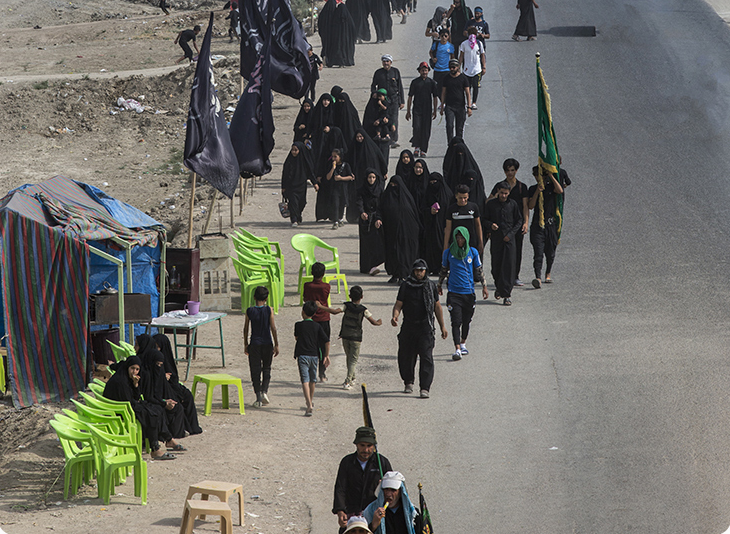The annual Arbaeen pilgrimage, which brings together millions of people from various Islamic and non-Islamic backgrounds across the world, holds a unique significance due to its religious, cultural, social, and psychological dimensions. Additionally, it carries profound political and economic implications that positively impact the broader region and the world at large.
Before delving into the details of these dimensions, it is important to note that this pilgrimage, which annually draws between 10 to 20 million participants, has garnered global attention in the past decade due to its remarkable features that continue to astonish observers. Notably, the pilgrimage takes place without direct government or official involvement, apart from the security and healthcare support provided by the Iraqi state. Instead, the services—ranging from food to accommodations—are offered voluntarily by Hussaini processions and civil society groups seeking divine reward and honoring the legacy of the Prophet Muhammad (PBUH), his pure family, and the noble principles for which Imam Hussain, his family, and his companions gave their lives on the eternal day of Ashura.
Another essential aspect to highlight is the peaceful nature of the Arbaeen pilgrimage, despite repeated attempts by terrorist groups to target pilgrims—attacks that have claimed many lives over the years. Yet, these threats have not deterred the devotees of Imam Hussain from participating, with numbers only increasing year after year, driven by unshakable determination and a readiness to endure all hardships along the journey to Karbala—the site of the sacred shrines of Imam Hussain and his brother Abu al-Fadl al-Abbas, peace be upon them. Many pilgrims walk hundreds of kilometers to reach the holy city.
A distinctive feature of the Arbaeen pilgrimage is the deep spiritual and fraternal bond it fosters among participants, regardless of their sectarian, ethnic, cultural, or religious backgrounds. This unity stems from a shared belief that the values and goals of Imam Hussain’s uprising are universal and timeless, transcending all divisions.
This massive gathering is driven by internal conviction and a profound awareness of the moral gravity of the Hussaini cause—its call to support truth, defend the oppressed, and reject injustice and tyranny in all forms. Many observers regard this collective energy as a true and powerful force that contributes to societal security and peace at both the regional and global levels.
Analysts also view the Arbaeen pilgrimage as an unparalleled symbol of unity, bringing together people of diverse sects, nations, and beliefs. It presents a profound counter-narrative to extremist ideologies, especially those propagated by takfiri terrorist groups that threaten global societies. The pilgrimage demonstrates a compelling capacity to resist such destructive ideologies.
It is also worth noting the participation of followers of various faiths—Christians, Mandaeans, Buddhists, Zoroastrians, and Yazidis—who take part in the Arbaeen procession. The Vatican regularly sends a delegation to walk long distances alongside pilgrims, as a gesture of love and respect for Imam Hussain and his companions who sacrificed their lives in defense of faith, justice, and truth.
Two principal dimensions stand out in the culture of the Arbaeen pilgrimage. The first is theological, rooted in the vast body of Islamic texts that emphasize the spiritual importance of visiting the shrine of Imam Hussain—making Arbaeen the largest and most diverse religious gathering in the world. The second is political, characterized by a clear rejection of tyranny, arrogance, and terrorism. It is an expression of resistance inspired by the moral and revolutionary legacy of Imam Hussain, calling for justice, freedom, and the dignity of all people in the face of global oppression.
Moreover, the intellectual exchange and cross-cultural communication that occur during Arbaeen—long recognized as foundational to civilizations east and west—constitute a powerful mechanism for peaceful coexistence. If nurtured, this intellectual harvest can significantly enhance societal harmony across religious and ideological lines.
One of the most striking aspects of Arbaeen is its embodiment of a profound volunteer spirit. The scope and scale of volunteerism seen during this pilgrimage surpass those of any institutional framework. For days and over hundreds of kilometers leading to Karbala, people give freely of their time, wealth, and energy without expectation of worldly reward—driven only by faith, love, and the desire to serve.
The pilgrimage also reinforces the values of social solidarity, which transcend religion and are deeply human. The Arbaeen experience nurtures generosity, altruism, humility, and the erasure of racial, ethnic, and national barriers. It emphasizes human and Islamic brotherhood alike. In Karbala, racial and cultural differences dissolve. Pilgrims from every background take pride in serving one another—exchanging not just food and water, but dignity and love.
Indeed, Arbaeen is rich with religious, cultural, social, and political values. But what makes it truly remarkable is the organic and emotional wave of humanity—men, women, children, and the disabled—moving toward Karbala, undeterred by hardship. This spontaneous, passionate, and selfless phenomenon has become a global event worthy of reflection and academic study.
In truth, Arbaeen offers a comprehensive model capable of addressing the deepest human needs—spiritual, social, and ethical. It serves as a station of moral and cultural recharging for generations, equipping them to resist the hollow materialism and spiritual sterility of modernity. Through its values of love, sacrifice, and justice, Arbaeen advances a global message of peace and brotherhood that transcends geography, race, and even religion.
Finally, the political implications of Arbaeen must be acknowledged. In a region plagued by instability, the pilgrimage generates tangible strategic and geopolitical outcomes that demand serious attention from global policymakers and research institutions. Arbaeen has emerged as a movement of moral and societal strength that defies traditional power structures—just as Islam itself spread across the world. The Hussaini cause, once confined to a single battlefield, has now entered the global consciousness thanks to modern communication and media, echoing its universal message across East and West.

